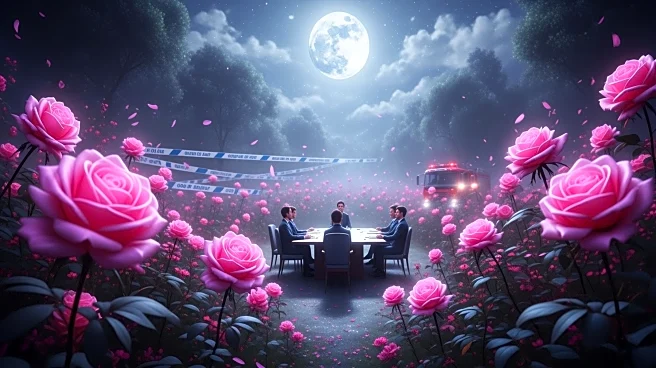What's Happening?
Philip Pullman, renowned for his young-adult fantasy series 'His Dark Materials', has concluded his latest trilogy, 'The Book of Dust', with the publication of 'The Rose Field'. Pullman's works, which
have collectively sold around 50 million copies, are known for their unique blend of fantasy and realism. Unlike other fantasy series, Pullman's narratives often incorporate real-world issues such as climate change and authoritarianism. 'The Rose Field' continues the story of Lyra, now 20 years old, who is estranged from her dæmon, Pantalaimon, and grappling with self-alienation. The novel explores themes of imagination versus reason, as Lyra embarks on a quest to rediscover her imagination, symbolized by a legendary rose garden. The series challenges traditional fantasy tropes by emphasizing the importance of imagination and the shortcomings of pure reason.
Why It's Important?
Pullman's work is significant for its departure from conventional fantasy narratives that often prioritize escapism. By integrating real-world issues and philosophical themes, Pullman offers readers a more grounded and thought-provoking experience. His exploration of imagination and reason resonates with contemporary societal debates about the role of creativity and logic in understanding the world. The series also critiques organized religion and authoritarianism, reflecting Pullman's progressive views. This approach not only enriches the fantasy genre but also encourages readers to engage with complex ideas about identity, consciousness, and societal structures. Pullman's storytelling challenges readers to appreciate the world as it is, rather than seeking refuge in fantasy.
What's Next?
With the conclusion of 'The Book of Dust', Pullman's future projects remain uncertain, but his influence on the fantasy genre is likely to persist. The themes explored in his works may inspire other authors to incorporate more realistic and philosophical elements into their narratives. Additionally, Pullman's critique of authoritarianism and organized religion may continue to spark discussions among readers and critics. As the fantasy genre evolves, Pullman's emphasis on imagination and reality could lead to new storytelling approaches that balance escapism with meaningful engagement with real-world issues.
Beyond the Headlines
Pullman's narrative style, which combines meticulous detail with fantastical elements, offers a unique reading experience that challenges traditional genre boundaries. His portrayal of magic as a tangible, textured phenomenon rather than an ethereal concept adds depth to his storytelling. Furthermore, Pullman's commitment to depicting the world as a place of interconnectedness and meaning underscores the importance of imagination in perceiving truth. This perspective encourages readers to value creativity and emotional intelligence alongside rational thought, fostering a more holistic understanding of the human experience.










